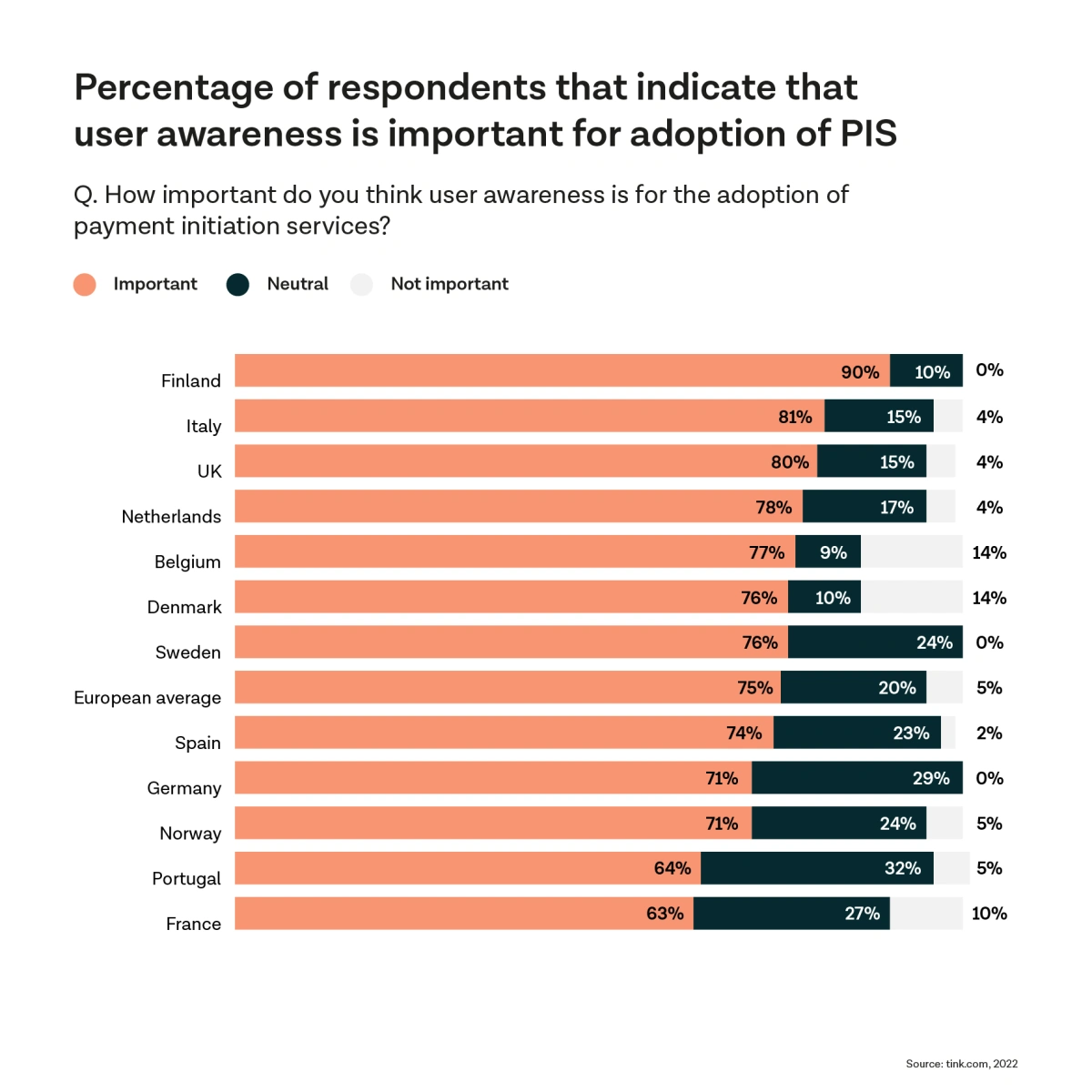Europe’s financial institutions embrace open banking payments
Stockholm, London, 31 May 2022: Financial institutions across Europe are betting big on open banking payments, according to new research from Europe’s leading open banking platform Tink, citing tangible benefits for merchants and their end users.
When asked to reflect on the most important benefits for merchants, three quarters of financial executives (74%) ranked increased payment security and fraud mitigation as key benefits of open banking payments. While the ability to deliver instant transfers (70%) and the potential to reduce costs for merchants (67%) are also seen as important advantages.
This enthusiasm builds on positive sentiment from 2021 — when Tink’s research showed that 72% of executives considered payments as the most important area of open banking to invest in.
This year, the survey of 380 financial services executives across 12 European markets also reveals the specific use cases executives believe are best suited to open banking payment initiation services (PIS), focusing on processes that are often inconvenient, frustrating, and time consuming for the user.
Ranking of use cases PIS are best suited to:
Peer-to-peer (P2P) transfers
Invoice/bill payments
Fund transfers for investments and savings
Online commerce payments
Barriers to adoption remain
However, the research highlights that there is still work to be done to ensure open banking payments realise their true potential. A lack of consumer awareness is cited as a major barrier, with 75% of respondents believing consumer awareness is critical for the adoption of open banking payments.

Another concern for executives is the current limited adoption of instant payment rails across Europe to enable real-time payments, which topped the poll of major barriers to the take-up of PIS.
Tom Pope, Head of Payments and Platforms at Tink, said: “Open banking has the potential to transform the payments industry. In certain markets we are already reaching a tipping point of user adoption, where financial institutions are embracing the opportunity and investing in a range of use cases. As a result, PIS volumes are growing rapidly.
“But there is still some way to go to remove barriers to mass-market adoption. That’s why we welcome the European Commission’s proposal to mandate the adoption of instant payment rails, and call on them to ensure that access to these rails is free for consumers. This move will ensure we have the infrastructure in place to continue to innovate whilst encouraging consumer uptake of open banking payments.
“Our research also shows the need for a solid foundation of consumer trust and awareness to allow PIS to reach its full potential. As an industry, we need to work together to create a common language around PIS so consumers can easily understand the service and its benefits.”
Partnerships for innovation
Unlocking the potential of open banking payments will require increased focus and investment from financial institutions over the coming months and years.
Fintechs have a vital role to play here — helping financial institutions enhance user experience, pioneer new use cases, and establish business models that allow all stakeholders to generate value from PIS.
Tom Pope, Head of Payments and Platforms at Tink, continues:
“Forging strategic partnerships with fintechs can help financial institutions innovate around APIs to remove friction and improve the end user experience. This is essential to driving mass-market consumer adoption of open banking payments over the next few years.”
To download the full report, go to:
tink.com/blog/open-banking/report-future-of-payments-open
ENDS
Contact details:
firstlight: 07796176044 / tinkteam@firstlightgroup.io
About the research:
For the fourth year in a row, we turned to independent market research organisation YouGov to conduct a wide-ranging survey on the attitudes and opinions towards open banking in Europe. All interviews were conducted by YouGov between 7 February and 31 March 2022, and included 380 prominent financial services executives spread across 12 countries:
The participants answered questions through telephone interviews and an online questionnaire (all in local languages, to improve the validity of responses). In order to be selected for the survey, participants needed to be i) senior decision makers or influencers, ii) employed by a regulated financial institution, iii) have confident knowledge of PSD2, and iv) have insight into the open banking investment plans.
About Tink:
Tink is Europe’s leading open banking platform that enables banks, fintechs and startups to develop data-driven financial services. Through one API, Tink allows customers to access aggregated financial data, initiate payments, enrich transactions, verify account ownership and build personal finance management tools. Tink connects to more than 3,400 banks that reach over 250 million bank customers across Europe.
Founded in 2012 in Stockholm, Tink became a wholly owned subsidiary of Visa in 2022. Tink’s 500 employees serve more than 300 banks and fintechs in 18 European markets, out of offices in 13 countries. We power the new world of finance.
For more information, visit www.tink.com.